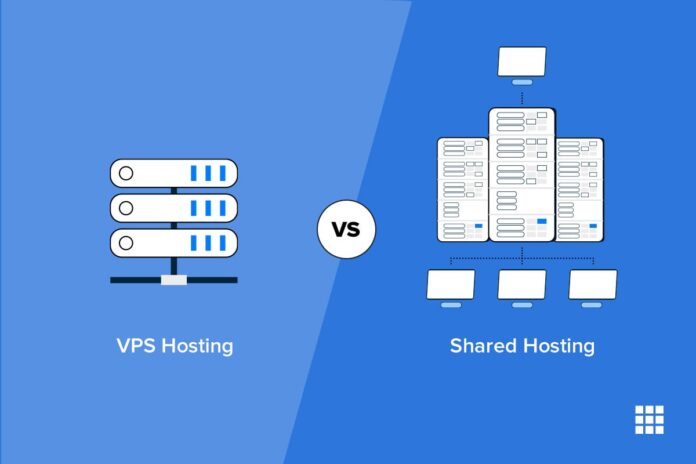The debate regarding the best type of hosting usually comes down to these two options – Shared hosting and VPS hosting. In this article, we will try to convince you to choose a VPS plan over shared hosting even if you are new to web development.
We will compare shared hosting to a virtual server, taking into account the problems of shared hosting and the advantages of a virtual server. But first, let’s make a distinction between the two types of virtual servers.
High traffic websites

High traffic websites are those that receive a large number of visitors and page views on a daily basis. Such websites require a hosting solution that can handle the high traffic and ensure that the website is available and responsive to visitors. VPS hosting is an ideal choice for high traffic websites as it provides dedicated resources and greater control over server settings, allowing for better scalability and customization to handle the traffic. With VPS hosting, website owners can also implement measures such as caching and load balancing to further improve website performance and reduce the risk of downtime or crashes due to traffic spikes.
E-commerce websites

E-commerce websites are online platforms where businesses sell products or services to customers over the internet. These websites require a reliable hosting solution that can handle high traffic, ensure fast page loading speeds, and provide a secure environment for transactions. VPS hosting is an excellent choice for e-commerce websites as it offers greater control over server resources and allows for custom configurations to ensure optimal performance and security. Additionally, VPS hosting can provide dedicated IP addresses and SSL certificates to improve website security and build customer trust. With VPS hosting, e-commerce website owners can ensure that their website is always available and responsive to customers, resulting in increased sales and customer satisfaction.
VPS vs. VDS

A virtual dedicated server (VDS) and a virtual private server (VPS) are effectively the same thing, with VDS offering hardware virtualization and VPS giving operating system virtualization. Both generate independent, secure private containers on the same physical server, allowing you to simultaneously install the operating system and run your project.
A virtual server performs similarly to a physical server, allowing you to adapt the system to meet the needs of your project. You can generate numerous PHP versions, create several FTP accounts, and change service settings.
Advantages of VPS
VPS hosting is a far more popular option compared to VDS, although they are quite similar. Since VPS is widely used and provided by far more hosting companies we will focus on it. Let’s take a closer look at the advantages that come with VPS hosting:
- Having a dedicated IP address
- Guaranteed resources
- The possibility to boost server resources without rebooting
- Higher level of security
Limitations of Shared Hosting

In order to reduce hosting costs, many website owners choose shared hosting, which entails many websites being hosted on a single physical machine. With shared hosting, websites share the physical servers and its resources.
Shared hosting offers advantages and disadvantages in terms of resource distribution. As previously mentioned, the biggest advantage is cost-effectiveness, as VPS hosting can be a significant investment for website owners that are on a limited budget.
With shared hosting you get the following disadvantages:
- No guaranteed resources
- Shared IP address
- The inability to modify configuration files
- The inability to install further software
Let us look at these limitations a little closer:
1. Scarcity Of Promised Resources
It’s not hard to conclude that in a system where multiple users have access to shared resources, everyone utilizes what they can. This means that, depending on overall demand and availability, the system may allocate various amounts of resources to your website at different times.
For example, your process may be able to access 2GB of RAM at one time while only being able to access 512 MB at another. Your website can sometimes load slower because someone else on the server is using more resources than anticipated. Consequently, a problem with one website on the server can have an impact on yours and all the other websites.
2. IP sharing
Because shared hosting allows several websites to share a single IP address, more than one hundred sites can be hosted on a single IP address. While this is a low-cost alternative, it does have some drawbacks, such as SSL installation and site optimization.
One potential difficulty with shared hosting is that a neighboring site may be blacklisted or blocked, resulting in problems with functionality for other sites on the same IP address. Furthermore, if the IP address of the shared hosting mail server is blacklisted, it can cause issues with email delivery.
3. The Inability to Modify Configuration Files

With shared hosting, the user has no control when it comes to altering configuration files, such as those connected to MySQL or other system configurations. Hosting administrators, who have the required permissions and experience to ensure that the system is optimized for all clients, often set up and configure these files.
This is not the case with VPS hosting, where you get a higher level of control over configuration.
4. The Inability to Install New Software

When it comes to installing additional software on a hosting account, shared hosting users know that it is impossible to do so. This is because shared hosting entails the sharing of resources and configurations among several users. As a result, only the administrator has the authority to install extra software to preserve stability and uniformity across the hosting environment.
Conclusion
In conclusion, even though shared hosting has some advantages, they cannot compare to those of virtual private server hosting. When choosing a hosting solution, make sure you don’t prioritize your savings over the quality of service you are getting.
